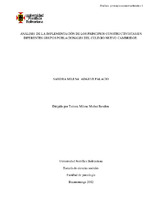| dc.contributor.advisor | Muñoz Rondón, Tatiana Milena | |
| dc.contributor.author | Adarve Palacio, Sandra Milena | |
| dc.coverage.spatial | Seccional Bucaramanga. Universidad Pontificia Bolivariana. Escuela de Ciencias Sociales Facultad de Psicología | spa |
| dc.coverage.temporal | 2012 | |
| dc.date.accessioned | 2015-01-27T16:04:28Z | |
| dc.date.available | 2015-01-27T16:04:28Z | |
| dc.date.created | 2013-03-06 | |
| dc.date.issued | 2015-01-27 | |
| dc.identifier.uri | http://hdl.handle.net/20.500.11912/1998 | |
| dc.description | 89p.: (pdf); il; tablas; anexos | spa |
| dc.description.abstract | Este proyecto hace parte de un macro proyecto denominado "Diagnóstico de la implementación de los principios constructivistas en el modelo pedagógico del Colegio Nuevo Cambridge". El objetivo del presente informe es analizar el nivel de aplicabilidad de los principios constructivistas del Colegio Nuevo Cambridge en tres grupos poblacionales así: 24 estudiantes, 13 administrativos, 16 padres de familia y el rector. Por medio de un análisis de discurso se encontró que los administrativos, estudiantes y padres coinciden que, en los procesos de aprendizaje es importante interactuar con materiales y objetos académicos para generar en el alumno proceso de modificación de conocimiento; el rol del docente dentro de un proceso de formación constructivistas es de un diseñador de procesos de aprendizaje significativo y las diferentes técnicas de evaluación de procesos académicos, proporcionan información relevante del nivel de conocimiento del estudiante. Sin embargo, no existe una correspondencia entre estudiantes y administrativo - padres de familia respecto el rol del estudiantes en el proceso de aprendizaje, puesto que, para los alumnos es fundamental tener procesos de formación relacionados con sus interese y motivaciones personales. Para los administrativos y padres dentro del proceso de formación del alumno es primordial la responsabilidad del estudiante en realizar todas las actividades académicas. Por ende, las apreciaciones de estos grupos poblacionales, respecto a los elementos de la teoría constructivista del proyecto educativo institucional, presentan los elementos del ejercicio académico en los que se implementa de forma a estas la fundamentación constructivista en el proceso de aprendizaje. De igual forma, los resultados de este proceso de investigación evidencian los factores del principio constructivista que necesitan reformas, para cumplir las normativas del proceso de aprendizaje constructivista. | spa |
| dc.description.abstract | This project is part of a macro project called \"Diagnosis of the implementation of constructivist principles in the pedagogical model of The New Cambridge School\" The objective of this inform is analyze the level of applicability of the constructivist principals of The New Cambridge School in three population groups distributed as follows: 24 students, 13 administrative, 16 parents and the principal. through an analysis of discourse we found that the administrative, students and Parents agree that in learning processes is important interact with materials and academic objects to generate in the student a knowledge modification process; they agreed also that the teacher’s role inside the constructivist formation process is design the processes of significative learning and the different techniques to evaluate academic process, which provides relevant information of the knowledge level of the student. However, there is no correspondence between students, administrative and parents about the role of student in the learning process, since; for the students is essential having formation processes related with their interests and personal motivations. On the other hand for the administrative and parents inside the student formation process is important the responsibility of the student on realizing all the academic activities. Therefore, the appreciations of these population groups regarding the elements of the constructivist theory of education institutional project, present the elements of the academic exercise in which is implemented at this, the constructivist foundation in the learning process. Similarly, the results of this investigation process highlight the factors of constructivist principles that need reform, in order to accomplish the norms of the constructivist learning process. | |
| dc.language.iso | es | |
| dc.publisher | Universidad Pontificia Bolivariana | spa |
| dc.rights | Attribution-NonCommercial-NoDerivatives 4.0 International | * |
| dc.rights.uri | http://creativecommons.org/licenses/by-nc-nd/4.0/ | * |
| dc.subject | Tesis y disertaciones académicas | spa |
| dc.subject | Colegio Nuevo Cambridge | spa |
| dc.subject | Diagnóstico | spa |
| dc.subject | Aprendizaje | spa |
| dc.subject | Escuelas privadas | spa |
| dc.subject | Comunidades escolares | spa |
| dc.title | Análisis de la implementación de los principios constructivistas en diferentes grupos poblacionales del Colegio Nuevo Cambridge | spa |
| dc.type | workingPaper | spa |
| dc.rights.accessRights | openAccess | spa |
| dc.type.hasVersion | publishedVersion | spa |
| dc.identifier.instname | instname:Universidad Pontificia Bolivariana | spa |
| dc.identifier.reponame | reponame:Repositorio Institucional de la Universidad Pontificia Bolivariana | spa |
| dc.identifier.repourl | repourl:https://repository.unab.edu.co/ | |


